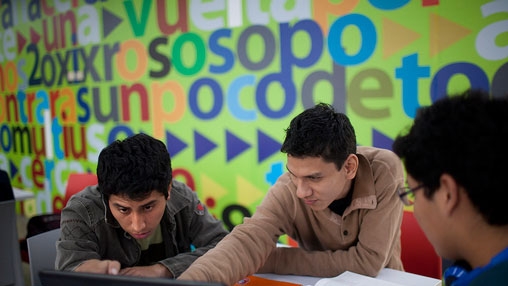For World Bank Group President, Jim Yong Kim, this generation, like no other before, can begin to imagine a world free from poverty. That was his message to students and representatives of the Pontifical Catholic University of Peru during a Town Hall webcast broadcast from the university’s Law auditorium.
Sharing the stage with Minister for Development and Social Inclusion – and PUCP alumna - Carolina Trivelli, Dr Kim answered questions from students and social media. Often speaking in Spanish, President Kim immediately captured the attention of the room - often joking with the audience and calling upon current cultural references to bring the debate to life.
Explaining that the true owners of the World Bank are the people of the world, Dr. Kim described how the Bank has changed in its approach to creating a world free from poverty by 2030. Today, gender equality, climate change and rights for the world’s indigenous peoples are seen as priorities, and, as such, are encompassed within the organization’s twin goals of a world free from poverty and building shared prosperity.
“The important thing is to connect words like social justice and poverty,” said President Kim, citing the Leader of the Liberation Theology Movement, Padre Gustavo Gutierrez, who he met with at the University campus in Lima.
An active conversation, questions came from both those present in the room and from a global audience via Facebook and Twitter - the event was broadcasted live nationally and globally via the web on the PUCP the World Bank Live sites.
Many of the online participants sent in their solutions for a world free of poverty. Via the WB livechat Diana de la Rosa, commented: “To end poverty, we must educate families, identify their strengths and expand their opportunities… the rest… they do themselves”. On Twitter @hector_Cardona6 said “#ittakes hard work with clear goals, applying a certain level of social responsibility from business owners and entrepreneurs.”


